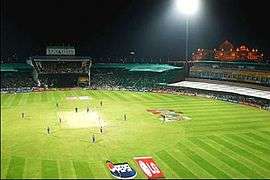Sawai Mansingh Stadium
|
Sawai Mansingh Stadium | |
| Ground information | |
|---|---|
| Location | Jaipur, Rajasthan, India |
| Establishment | 1969[1] |
| Capacity | 35,000[2] |
| Owner | Rajasthan State Sports Council |
| Operator | Rajasthan Cricket Association |
| Tenants |
Indian Cricket Team Rajasthan cricket team Rajasthan Royals Jaipur Pink Panthers |
| End names | |
|
Van Vihar Colony End Garh Ganesh Temple End | |
| International information | |
| First Test |
21 February 1987: |
| First ODI |
2 October 1983: |
| Last ODI |
16 October 2013: |
|
As of 21 June 2014 Source: Sawai Mansingh Stadium, Cricinfo | |
The Sawai Mansingh Stadium is a cricket stadium in Jaipur, Rajasthan, India. It was built during the reign of Maharaja Sawai Man Singh II who was also known as SMS, hence the name of the SMS Stadium. It is situated at one corner of the Rambagh Circle. The stadium seats 23,185. As of July 2013, the stadium and grounds could be toured using Google Street View.
History
The Sawai Mansingh Stadium has hosted a solitary Test match, between India and Pakistan, starting in February 1987, when Pakistan President General Zia-ul-Haq crossed the border to watch the second day's play as part of his "Cricket for Peace" initiative.
The Test was notable for Younis Ahmed's return to the Test fray after an absence of over 17 years and also for Sunil Gavaskar's dismissal to the first ball of the Test match, for the third time in an otherwise illustrious career.
The game sputtered to a draw after the third day's play was abandoned following heavy rain and a controversy over the alleged deposition of sawdust on the wicket which Pakistan objected to.
The stadium's ODI debut had kicked off with a contest between the same two sides on 2 October 1983. Fresh from their World Cup triumph, the Indians comfortably won by four wickets, sporting the same XI that won the World Cup final.
The ground has also hosted two World Cup matches in 1987 and 1996 respectively, the West Indians losing to England in the former and beating Australia in the latter. The last ODI played on the ground is between India and Australia on October 2013 which they won comfortably by just losing one wicket chasing 362 in just 43.3 overs although it was a disgustingly flat wicket which provided nothing for the bowlers in the slightest.
The highest individual score by any batsman on this ground in ODIs is 183 (not out) by Mahendra Singh Dhoni.
This is also the venue in which Virat Kohli made the fastest 100 for India in ODIs as India chase total of 359 against Australia which was second highest successful chase in ODIs, after the Johannesburg epic between Australia and South Africa.[3]
Re-development
In 2006, the stadium underwent a major renovation at a cost of Rs 400 crore.[4] A world-class cricket academy was built for Rs 7 crore, which has 28 appointed rooms, a gym, a restaurant, 2 conference halls and a swimming pool.[5]
New facilities:
- Media rooms
- Galleries
- 2 new blocks
- Capacity
Matches
The first ODI, played at Sawai Mansingh stadium, kicked off with a contest between India and Pakistan in 1983, in which, India won by four wickets. The 1987 Test between India and Pakistan proved to be an instrument of peace, when Pakistan President General Zia-ul-Haq came over to witness the second day's play as part of his "Cricket for Peace" initiative.
The game, which saw Sunil Gavaskar being dismissed to the first ball of a Test match for the third time in his career, ended in a draw amid a controversy over the alleged deposition of sawdust on the wicket that Pakistan objected.
Sawai Mansingh Stadium has hosted IPL matached for Rajasthan Royals its local team and who won first season.
Royals have been deprived of their home advantage because of the inability of the Rajasthan Cricket Association to acquire requisite state government clearances.
Ground Records
- The highest ODI total at this ground is 362-1 by India against Australia in 2013-14.
- The lowest ODI total at this ground is 135 by India against Pakistan.
- The highest individual score by any batsman on this ground in ODI is 183 not out by Mahendra Singh Dhoni on 31 October 2005.
- The Sawai Mansingh Stadium, Jaipur is situated in the picturesque state of Rajasthan, India. The stadium has hosted only one Test between India Pakistan and it has hosted a number of ODIs.
- This is also the ground where Sourav Ganguly and Sachin Tendulkar most successful opening pair for India in ODIs opened the innings for the first time.
Test cricket
The stadium has hosted following Test matches till date.
| Team (A) | Team (B) | Winner | Margin | Year |
|---|---|---|---|---|
| | | Drawn | 1987 |
Latest progress
After announcement of shifting of some Indian Premier League matches in Maharashtra due to a severe drought situation in 2016, the IPL franchise Mumbai Indians opted for this stadium as its home ground as a substitution for Wankhede Stadium in Mumbai.
Major Tournaments
- 2006 Women's Asia cup
- 2006 ICC Champions Trophy
- 1987 & 1996 Cricket World Cup
See also
- Rajasthan State Sports Council
- Sawai Mansingh Indoor Stadium
- List of Test cricket grounds
- One-Test wonder
References
Coordinates: 26°53′38.51″N 75°48′11.61″E / 26.8940306°N 75.8032250°E

